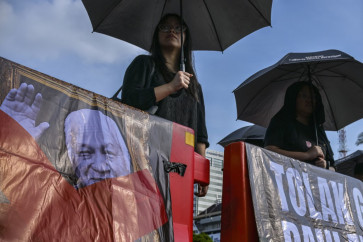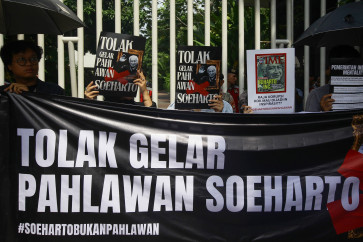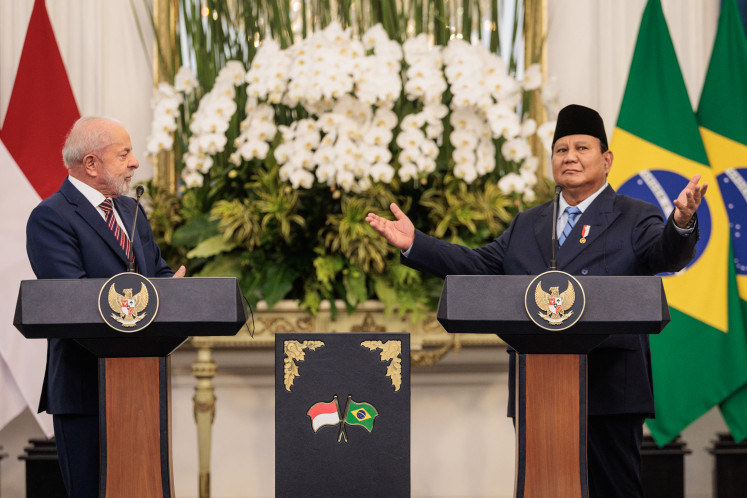Popular Reads
Top Results
Can't find what you're looking for?
View all search resultsPopular Reads
Top Results
Can't find what you're looking for?
View all search resultsNegotiating a new regional order for economics and politics
As the first quarter of 2015 comes to a close, ambitions for regional economic integration are running high in Asia
Change text size
Gift Premium Articles
to Anyone
A
s the first quarter of 2015 comes to a close, ambitions for regional economic integration are running high in Asia. Three major frameworks for economic integration are slated for completion this year.
The ASEAN Economic Community (AEC) is expected to be in place by December 2015. While substantive negotiations over the Regional Comprehensive Economic Partnership (RCEP) are expected to conclude by the end of the year, the US-led Trans Pacific Partnership (TPP) is expected to be completed within 2015.
Given the strains in the political landscape interspersed with questions regarding the success of democracy itself, the euphoria about the ASEAN century is being questioned. Some observers view such attempts at regional integration with pessimism terming ASEAN integration an 'illusion'.
Community-building efforts have been hampered by its members' lack of unity, and more recently, the political challenges at home for some of the member nations, such as Thailand and Myanmar.
More optimistic assessments have labeled it a 'work in progress'. It is evident that ASEAN integration has not entirely materialized. Similarly, negotiations over the RCEP are yet to yield any significant breakthroughs. The only solace for Asian powers is that even the US-led TPP has not made headway.
In order to enable the integration process, negotiating parties need to muster the political will for either the AEC or RCEP. As a central player in regional stability, ASEAN has an important role to play.
Critics of the AEC and RCEP should also consider the political gains from both the frameworks, rather than focusing on economic costs alone.
In these strained times, Asian countries participating in the integration process need to reiterate their political position more than before.
The economic gains of concluding the AEC and RCEP are clear. The ASEAN gross domestic product is US$2.3 trillion, while the RCEP is expected to cover 28 percent of the world economy. The AEC promises to stimulate economic growth further by creating a single market and consolidating ASEAN as a global economic player. The region's combined economy would be the world's seventh largest.
Similarly, the RCEP promises to ease flows of goods, services, investment, and labor among its members. According to Asian Development Bank estimates, implementation of the RCEP will bring income gains of $240'644 billion to the world economy in a decade or so. More importantly, the RCEP will help consolidate existing bilateral trade agreements and harmonize customs procedures.
However, security, maritime conflicts and domestic unrest are threatening to undo this economic boon. China, Taiwan, Malaysia, Brunei, Vietnam and the Philippines remain embroiled in territorial disputes over the Spratly Islands in the South China Sea. Piracy is also on the rise in Southeast Asia's waters, with organized pirate networks targeting fuel tankers.
The AEC will consolidate ASEAN cooperation in economic matters; it will also foster closer security cooperation among ASEAN members. With the RCEP and TPP encouraging greater involvement in the region by China and the US respectively, there is also scope for these powers to contribute to regional stability.
From being overshadowed by the Chinese economy to reconciling with the US pivot, ASEAN's efficacy and credibility have been questioned in the recent years. With political tensions underscoring the progress of the AEC, it is essential for individual member countries to prioritize AEC's vision and look beyond internal obligations.
Effective cooperation can provide answers to many domestic problems including issues, such as food and energy security, to employment generation.
The success of the AEC will also in turn feed the RCEP. ASEAN has played a central role in the region's efforts at economic integration. The ASEAN Free Trade Agreement forms the centerpiece around which other agreements and forums, such as the ASEAN Plus Three FTA or the East Asian Summit convalesce (often dubbed as 'ASEAN
Centrality').
As a consensus-driven organization that does not pose any threat to other major powers, ASEAN is in a unique position to drive regional stability by providing a neutral middle-ground upon which other powers can work together and iron out their differences.
Rather than being a stumbling block to regional integration, the 'ASEAN way' of consensual decision-making provides a means through which the interests of multiple nations can be negotiated and eventually brought to a convergence.
With the AEC in place, ASEAN can further consolidate its economic position, providing other larger economies with a greater incentive to engage the region.
More importantly, concerted efforts at tariff reduction and customs harmonization will lay the foundations for further economic integration of the Asia-Pacific region.
ASEAN's economic consolidation will provide it with a good foundation for its role in engaging other major powers, such as China, the US and India. This will serve to extend the peace dividend from ASEAN borders to the broader Asia-Pacific region.
But first, ASEAN will need to put its own house in order. This means greater efforts at completing the AEC by its deadline of December 2015. Such efforts will require strong political will among ASEAN members.
There is no doubt that the AEC and RCEP will eventually benefit all its members and bring forth greater business and investment opportunities for the region. The political gains of regional stability and stronger bilateral ties are equally, if not more, important.
As the world's most successful economic and political union, the EU is a good example. The economic and political success of the EU shows that regional integration is not simply a matter of economics, it is also a political issue.
There is thus a need for greater political will and collective action on the part of negotiating parties. ASEAN members will need to address domestic political issues before regional level consolidation can commence.
Regional integration may entail short-term costs, especially when protected industries are liberalized. Domestic constituents will need to understand that the short-term pain of liberalization and tariff reductions is necessary for long-term economic gains.
Political leadership will play a key role in helping business and private sector understand and reconcile with the initial differences in gains for individual member nations and also address the contentious issues of development divide among the member countries.
A crucial step would be to establish a strong regulatory and monitory mechanism, and build administrative capacity in tandem with a stronger ASEAN secretariat to ensure an enabling environment for the LDCs. Such an entity can only exist by political consensus of the member nations.
Ultimately, the political and bureaucratic commitment of member states to push toward the common economic agenda will determine the realization of AEC goals.
Regional integration is inherently a political endeavor representing visions for a new economic and political order within which nations can flourish amidst regional stability.
This will first require recognition of the political nature of regional integration and the political will required for its success, before we can fully reap the economic gains and peace dividend associated with regional integration.
____________________
Woo Jun Jie is a researcher at the Singapore University of Technology and Design and Suvi Dogra is an independent analyst.










